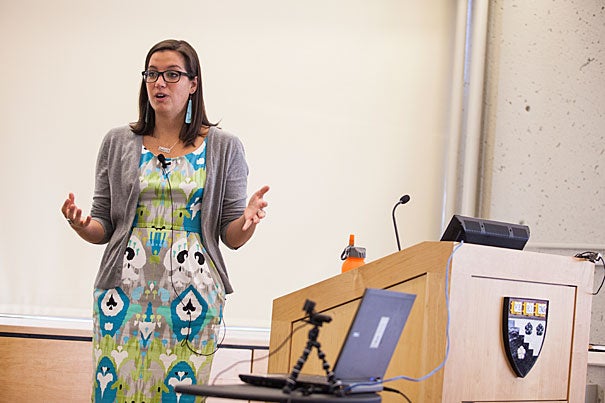
Adrienne Keene (photo 1) presented her dissertation in front of a public audience as part of the Harvard Graduate School of Education’s annual dissertation and capstone defenses program. Professor Sara Lawrence-Lightfoot (photo 2) listened and made notations during Keene’s 90-minute defense.
Photos by Melanie Rieders
A capstone to learning
In Ed School programs, students defend their dissertations before public
Allison McLaughlin, sitting in a fifth-row aisle seat at the Gutman Conference Center, raised her hand and was acknowledged by Adrienne Keene, a Harvard Graduate School of Education (HGSE) student who was nearing the end of her 80-minute dissertation defense.
Keene is a member of the Cherokee Nation of Oklahoma, and McLaughlin wanted to know how “being an insider shaped her research” on how Native Americans transition to college. Keene’s dissertation is “College Pride, Native Pride, and Education for Native Nation Building: Portraits of Native Students Navigating Freshman Year.” (Keene’s dissertation committee was chaired by HGSE’s Sara Lawrence-Lightfoot, the Emily Hargroves Fisher Professor of Education.)
Keene’s answer to McLaughlin’s question offered one of her defense’s most engaging moments. “There’s sometimes a tension between being a ‘good’ Indian and a good researcher,” said Keene. “For example, when I was making home visits with the Native American students I focused on, I reached out to them and arranged the home interviews like a researcher, rather than waiting to be invited to their homes like a ‘good’ Indian. I understand both sides. Doing research in indigenous communities is a lot about trust and respect, and they trusted me as an insider.”
Forty-one students from HGSE’s Doctor of Education and Doctor of Education Leadership programs have been presenting their dissertations and capstone projects — “descriptive, analytic, and reflective account[s] of the third-year student’s leadership of and contribution to a strategic project” — in front of public audiences since April 11, continuing through Tuesday.
HGSE Dean James E. Ryan, who is also a professor of education, explained that these students “are perhaps the foremost experts in the world on their particular subject. These defenses aren’t just an integral component of our doctoral training. They are also an opportunity for this school to open up its most valuable resource — the knowledge of our students — to the world.”
Elizabeth City, director of the Doctor of Education Leadership Program and a lecturer on education, who also chairs four committees hearing capstone projects, sees important benefits in the public process.
“The students presenting have to summarize rich work very succinctly,” said City, “which forces them to clarify their own thinking and consider how to tell the story of their work to others who may have no familiarity with it or with the particular jargon of the student’s academic preparation. This is important for making an impact in the field, where how you tell the story is as important as what you have to say.”
HGSE’s Steven Seidel, the Patricia Bauman and John Landrum Bryant Lecturer on Arts in Education and director of the Arts in Education program, agreed. “It’s important for students, when they are doing research, to consider the public value of what they’re doing. Making your research public, putting it out there for people to question directly, is really important,” said Seidel, who was committee chair of a public dissertation defense on April 14. “It’s a good reminder of the public responsibility researchers have. And the public may ask questions that the committee hasn’t asked,” forcing students to prepare more carefully.
As City explained it, “Opening the doors can make for higher-quality work in the way that public performance of any kind encourages people to take their work to another level.” City added that having students communicate publicly about their capstone projects aligns with the Doctor of Education Leadership Program’s mission.
“Being able to stand up in front of a group of people, talk about what you did, why you did it, what you learned, and what the implications are, is a critical act of leadership,” she said.
The process can even be fun, said Bridget Terry Long, HGSE’s academic dean and Xander Professor of Education and Economics. “Students have told me that they have enjoyed the defense as a celebratory event during which they get to show the product of all their hard work. They walk away with a heightened sense of pride and accomplishment they would not have otherwise experienced without having such a public venue.”
Outside in the hallway just minutes after her dissertation defense had ended, a relieved Keene smiled when asked about the open nature of her session. “I was glad for it,” she said. “Often, research gets put in a book that gets put on a shelf in a library, and not many people ever engage with it. This was real public engagement.”




